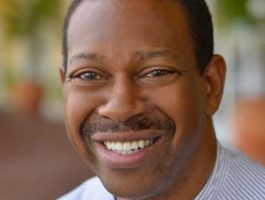
Wise Decisions Brave Men Make
Authors Gary Chapman and Clarence Shuler tell about the unique mentoring relationship they began when Shuler was a teen. Together they talk about the 11 wise decisions young men must make in order to live a great life such as: seeking wisdom from parents and trusted adults, making technology work for you, respecting girls and women, and being sexually responsible.
Show Notes
About the Guest
-
- Learn more about FamilyLife's Art of Parenting®. https://www.familylife.com/parenting/
-

Clarence Shuler
Clarence Shuler is the President/CEO of BLR: Building Lasting Relationships. Clarence is a counselor, speaker, and author of several books, including Winning the Race to Unity: Is Racial Reconciliation Really Working?, Keeping Your Wife Your Best Friend and Single and Free to Be Me. He and his wife, Brenda, live in Colorado Springs and have three adult daughters. For more information, visit clarenceshuler.com.
Gary Chapman
He has degrees from some of the most respected colleges and seminaries. He's written some of the best-selling books of the past decade and appeared on numerous radio and television programs across the country. But Dr. Gary Chapman knows more than just a lot of scholarly theories and practical advice—he knows people. He knows how to relate to people, how to have fun and how to make people laugh, all the while giving practical tools to help improve relationships.
Gary Chapman and Clarence Shuler tell about the unique mentoring relationship they began when Shuler was a teen. Together they talk about the eleven wise decisions young men must make to live a great life.
Wise Decisions Brave Men Make
Bob: This is FamilyLife Today for Monday, August 5. Our hosts are Dave and Ann Wilson, and I'm Bob Lepine. What can we do to help young men make good choices during their teen years? We'll talk with Gary Chapman and Clarence Shuler about that today. Stay with us.
And welcome to FamilyLife Today. Thanks for joining us. I know that one of the reasons that you look back on your days as an athlete—I say look back on—because it's past. [Laughter]
Ann: Oh, honey!
Dave: Did you say it's past? Oh, what a way to start the day! [Laughter]
Bob: One of the reasons you look back with fondness on your time in high school and college athletics—
Dave: You might be talking about Ann here! [Laughter]
Bob: You look back on those—not just for the athletic competition—but those were character-shaping, character-forming experiences for you; weren't they?
Dave: Yes, I think every athlete feels that way—the thing you miss is not the game, it's the community and the guys you did it with—and what it built you to be as a person—I really do.
Bob: Is there a dominant lesson learned as an athlete? I mean if you would say, “This marked me for life. I'm a different man because I learned this from playing football.”
Dave: I know what I think.
Bob: Yes.
Dave: I think it would be interesting to know what Ann thinks.
Bob: Yes, do you think there's something that marked him as a man from playing football?
Ann: Hmm. I'm interested that you wonder—
Dave: I can't walk very good anymore. [Laughter]
Ann: I think it's that attitude of never give up. Never give in. Work hard and be a team player. Those are the first things that came to my mind.
Dave: First thing that came to my mind—perseverance. I mean—those days when you had to run sprints at the end of practice in the pouring down rain. It was the worst. And it was the best, because it taught you—that's life! You've got to grind through and get it done.
Bob: One of the reasons to have this conversation about life lessons and character qualities that should be instilled in young men—and young women—but our focus today is really on young men. We've got some friends in the studio today with us who have given this a lot of thought and we're glad to have them—Clarence Shuler and Gary Chapman joining us today. Welcome.
Gary: Thank you.
Clarence: Hello, Bob. Good to see you again.
Bob: Gary Chapman. People go, “I've heard that name before.” Most listeners who are familiar with the Five Love Languages know that topic—that book. You've gone on to write dozens of other books. Clarence has been a friend for two decades—he's a part of the FamilyLife Weekend to Remember® conference speaker team. He and his wife, Brenda, speak at our getaways all across the country. The two of you actually crossed paths—what did you tell me? 49 years ago? Is that right?
Clarence: Well, 49 years ago, he led me to Christ, but I actually met him two years before that.
Bob: So, tell me the story. How'd you meet Gary?
Clarence: In Winston-Salem, North Carolina, 1968, my friend Russ was going to an integrated school and I was going to an all-black school—and Russell was a ladies' man. [Laughter] These white girls invited him to this gym to play basketball—this church had built a family life center.
Bob: Right.
Clarence: He was really short—he was only like, four feet, seven inches tall. I was much taller—I was four feet, eight. [Laughter] So I was his bodyguard—because back then if you were black, you didn't go to a white situation by yourself.
Bob: Right.
Clarence: We had to talk our parents into letting us go. That was really bold for the time.
Bob: This is North Carolina in '68.
Clarence: '68
Bob: Yes.
Clarence: About 100 kids—only two black kids—Russell and me.
Bob: Wow.
Clarence: So we went there and we started playing ball and this guy comes on the basketball court—this adult—and he's trying to play ball with us. He’s really nice, but there was something different about him—so I watched him for two years.
Bob: Wow.
Clarence: I'll never forget—we were at this retreat in Hillsville, Virginia, and he said, “Is your life complete—or is there something missing in your life? I had great parents. I had a great older sister. I was doing well in school—B student—didn't have to study that hard. I made the basketball team, but—and we had one of the best teams in the state—but there was an emptiness inside. I struggled being black. I struggled being short.
But then, he shared John 3:16 with me. I'll never forget it. He said, “For God so loved Clarence—“ And I knew enough about church—I'd been baptized, sang in the choir, even though I wasn't a Christian—I said that the verse doesn't go that way. [Laughter] He said, “Clarence, when God is thinking about the world, He's thinking about you.” And that blew my mind.
Ann: How old were you, Clarence?
Clarence: I was 16.
Ann: Okay.
Clarence: I accepted Christ that night.
Bob: And Gary, your role at the church in 1968? Were you the youth pastor?
Gary: I was an associate pastor, but I was doing young people's work and also directed our camp in the summer time. When Clarence and his friend walked in that night, I knew it was very different and somebody told me that some of our gals invited them and I said, “Great!”—so just went out and met them.
Bob: Was the church a majority white church?
Gary: Our church was, yes. In fact, almost all the churches in the South were segregated at that time—there wasn't a lot of interfacing between churches of different races.
Bob: So to have an African-American family show up at your church was—was that a tense situation at all?
Gary: Well, I think it may have been for some of the students—and to me, it was obviously different—but I was committed to reaching people, regardless of color. When I had been a student at Moody Bible Institute, I worked one summer at a summer Bible camp and I was the only white counselor in an all-black camp, so I'd had the experience on the other side of that. I really wanted these two guys to have a good experience.
Bob: Don't you love this story? Isn't it great?
Ann: Yes. It's so good.
Clarence: It was intense though, for us going. The church on the other side of the tracks—you know in the South—a lot of times railroad tracks determine who lives on what side. We walked—it was about four miles from our house—and we walked there. As soon as we crossed those railroad tracks we got serenaded with all kinds of names and people throwing bottles at us, so it was very seriously intense for us.
Bob: From the white community—or from your own community?
Clarence: From the white community.
Ann: That was scary for you, Clarence. What did that feel like?
Clarence: Well, we were teenagers, so we thought we were invincible. We were really fast, so we didn't worry about it. No one could hit us.
Ann: Yes. Or catch you.
Clarence: —or catch us. Yes—that was not really an issue—but it was a reality check for us. It's going to cost us something to go to this church. I was telling him, “We'd better be good if we're going to do something.” But when we got there it turned out to be really great, and a safe environment—I didn't know if it was going to be safe or not.
Bob: Your relationship with Gary started when you were a teenager, but it's continued through the years. He has been, from a distance—a mentor—a spiritual father to you.
Clarence: He started discipling me about a year later when I was 17. I ended up going to Moody Bible Institute. But then when there were crises in my life, he was always there—and even before. I'll never forget when I was at Moody, and I was working about 34 hours a week because my parents couldn't afford to send me to school, and stuff like that. He sent me a sweater—he even sent me some money. 30 bucks—”Buy a sweater. I saw the weather forecast and it's going to be cold. Get a sweater.” I'm like, “Who is this guy?”
When my dad died—when I was 20—the first person I called was not my mom, I called Gary. I said, “My dad has died—go take care of my mom.” You know, until I could get home. You know, he kind of became my spiritual dad. I mean he was my spiritual dad, but he also became my dad like—even if he wasn't old enough—but really my dad.
Bob: There were a lot of young people in your church. God gave you a special heart for Clarence and his family; didn't he?
Gary: Yes, He did. The very fact that they came to me spoke the fact that they were interested—they wanted, you know. And I learned a lot. I remember once, early on, I was going to pick up Clarence and his friend over at his house and take them somewhere. I pulled up in front of the house, I get out of the car, and they walk out on the porch. And I say, “You boys ready to go?” And his buddy said, “I ain't no boy.”
I said, “Okay, we need to talk—I need to listen.” That was the beginning.
It's trying to understand each other and learn from each other—with the differences in cultures. Of course, back then, it was huge. I remember in Winston-Salem, in 1967—they brought out the National Guard and they were standing on the streets, for fear that something was going to happen.
Dave: Did you ever think that some 40 years later you'd be sitting here—still in relationship—still connected?
Clarence: I was excited to accept Christ, but I didn't know what relationship he and I would have. I didn't know if I would just be a stat—”I led some black kid to the Lord.” I didn't know what it would be like. For me, it was very risky. But without question, becoming a Christian was the best decision I ever made. Then, having this guy in my life is priceless. He's grandpa to my kids, too.
Gary: I don't think either one of us ever thought we were going to write books. [Laughter]
Bob: But you had an idea for a book—
Gary: I don't know about—not back then. [Laughter]
Bob: But a few years ago you had an idea for a book—
Gary: I did, yes, I did. [Laughter]
Bob: It was a burden that God had put on your heart for young men growing up in the African-American community—a lot of them fatherless.
Gary: Yes.
Bob: A lot of them facing economic disadvantage. I was listening to guys talk recently about the two Americas—white America and black America being two different Americas. The experience of growing up in the black community is a different experience than what I experienced growing up in the white suburbs. So, your burden was to try to find a way to communicate character issues to these young men who are growing up without a dad speaking this into their life.
Gary: Yes, I wanted to address, not only blacks, but whites, and hispanics—all young people. The thesis of this book is that the decisions a young man makes in those years—11-18 or so—are going to greatly impact the rest of his life. And we know that we are losing far too many young men by the time they get to be 18. They're already on a track that's destructive, for them and others.
And it's not just the black community; it's the white community and the hispanic community as well. But I really did have a burden for the African-American community. That's why I knew, when I was going to write this book—I've written a lot of other books before—but I knew I was going to write this one with Clarence. Assuming he would write it with me. [Laughter]
Bob: How did that conversation go? Did you say, “I have an idea for a book. Would you be interested?”
Gary: Do you remember, Clarence? [Laughter]
Clarence: Yes, he just said that he'd been praying about writing a book, but he wanted to write it to young men. He didn't necessarily say African-American—but just young men. And he said that the name that keeps coming up to write it with him was mine.
I was really excited because he's had success writing more than two books. [Laughter]
I've written a few, but not on that scale. So that was really a big deal for me—to do something together—because again, it's not just writing with him because he's famous or whatever—it's because he's like one of my dads. To me, the bonus is spending time with him.
Bob: Yes.
Clarence: Even in that, just his generosity and graciousness in writing the book—so open to stuff—that is special to me.
Bob: Yes, I'm just imagining—Gary Chapman calls and says, “Would you like to write a book together?”
“Let me pray about that, yes.” [Laughter]
Clarence: It was like that.
Bob: —it doesn't take a whole lot.
The 11 character qualities in Choose Greatness—did you have these qualities in mind when you got together? Or did you and Clarence brainstorm these 11 together?
Gary: I think we brainstormed them together. Just looking at—what are the issues here? What are the challenges? If you could give 11 challenges to young men in making wise decisions, what would be the areas you'd want to address?
Bob: Were there some that you came in knowing—I definitely know that I want to make sure we talk about—like if it was Dave—he's going to talk about perseverance as one of those things. Did you have some of those things already on your heart?
Gary: Yes, I think that both of us did. On my heart was the whole area of sexuality because I work with so many young adults who have really messed up their lives in that area. And the other was the whole area of drugs and alcohol. So yes, there were some that were really on the front burner with me.
But there's a lot of other decisions that a young person has to make. It's not just notdoing certain things—it's doingcertain things as well.
Ann: Clarence, did you have some hot topics that you thought—these things need to be addressed?
Clarence: I can't remember who did what, but I think that whole idea of having a mentor
or a father-like deal was a big deal for us—the wisdom that you get from a parent was something that I thought we should have in the book. The diverse part was—I don't know if that was mine or yours—but that's important, too, especially in this climate today—it’s always been, but for us, it's been kind of a big deal that we're talking about that.
Gary: I think the whole concept of trying to develop friendships across racial and cultural lines—that was one of the challenges we gave—choose to build diverse friendships because our relationship has meant so much to both of us—and to our families—it's not just us—it's our families. We are family.
Clarence knows that everything I have is his, and I know that everything that he has is mine. That's just the way it is in a family. So, we wanted other people to experience what we've experienced. So the challenge is—don't let all of your friends be of the same race or the same culture, but learn to develop friendships across cultural and racial lines.
Dave: As you think back—this has been a long, long relationship—and it's really unique—very unique. Looking across the table at you two—it's like this doesn't happen every day. We're going to dive in to some of the thoughts from the book, but what is a learning you've learned from each other as you've mentored and had this relationship?
Does one thing jump out from either one of you? Like, “I have learned this from Clarence. I have learned this from Gary about life, or about anything.”
Clarence: I think for me—two things. One—it's okay to be different. Different doesn't mean less than or more than. I think with Gary—when we first started meeting—because white guys didn't come to my neighborhood unless we were paying bills—so the white guy came to your house to collect—stuff like that. So, for him to come to my neighborhood—to me—he might not know—it took tremendous courage. That was not necessarily a safe place for him to come into.
But when we had the issue—when he called us boys—and we were 14, and we were boys—we had seen our dads be called boys, and they were grown men—but the fact that he stopped afterwards and before we got home, we talked—maybe an hour or two—I'm not sure. But he gave us perspective, so it helped me to learn to listen. It helped me to at least to think about giving people the benefit of the doubt, when we have a different perspective on issues. Those are two big things that resonate with me.
Dave: Those are huge.
Gary: I agree with that. I think one of the big benefits for me is that Clarence and his friends really helped me listen and understand a different perspective. We all grow up in our own world and that's the way we see the world, but somebody else grew up in a different world, and so listening to them and understanding them, and then realizing that in spite of the differences, we can have a good relationship—we can have a friendship. We can love and help and encourage each other. That's probably the biggest thing for me is the benefit of having that kind of friend.
Dave: I love the—the simple fact that can easily be missed is that you both had courage. You, to go to a white church as a young man—many people have never done that—you did it. Here's the result—you walking into a black community and saying, “I don't care. This is God's heart. I'm going to step through a wall to make a difference.” And here we are.
Clarence: Well, I'm really not that spiritual—it was basketball. [Laughter] I'm a teenage boy. No, it was girls—and the girls couldn't help it that they were white. We just had to overlook that. [Laughter] I wasn’t going to be that spiritual.
Something you also need to know about Gary—the more time I spent with him, the more I'm learning about him. I'm not the first black guy in his life. He grew up playing basketball as a teenager with black guys. His daughter, Shelley, found a picture of him when he was at Moody—he's got a Sunday School class and he's got these kids, and they're all black. He's holding a black girl in his arms, and he's like 20 years old. So, I'm not the first guy—I didn't put this cross-cultural thing in his heart—he's always had that—or he had it before me.
Bob: Gary, I just have to ask you—as a pastor in the South in the 60s—with that being a part of just who you were—did that create challenges for you? Did you have people who said, “What are you doing spending all of your time those folks?”
Gary: I didn't have anybody say that, but I do remember one day in our church—because Clarence started coming to the church, after he became a Christian—one guy said, “Who's that black dude with you today at church? I said, “He's not a black dude. That's Clarence.” So you know—there was some of that. Any time you cross over into places where you don't normally go or see people—
Bob: Right.
Gary: —there's some of that. But, I didn't have a lot of pushback, to be honest with you.
Bob: I think that's unusual, which probably says something about your character, and something about the environment, the culture that church created.
Clarence: Well, another thing, too. He would have me come to his house every Saturday morning and do discipleship. I would see his neighbors look at him when I'm coming into the house, and I'd not seen that look before. I don't know if he saw it, or just ignored it, but I saw it—so I was concerned for him and his safety, by me being his friend.
Bob: Yes. I want our listeners to know what you're addressing in this book. This is actually a book that you've written with young men in mind—not with their dads. This is a book a young man could read, or a youth pastor could take him through. Eleven wise decisions that a young man could make that would reshape—redirect his life. And again, it doesn't matter whether he's growing up in a black community, white community. These are just decisions that are wisdom decisions.
Choose to seek wisdom from parents and trusted adults. Choose to seek knowledge through education. Choose to make technology work for you. Choose to be successful—work hard. Choose to respect girls and women. Choose to be sexually responsible. Choose to live longer and happier, that is—avoid drugs and alcohol. And the second part of that is—avoid tobacco and marijuana. Choose to build diverse friendships. Choose to invest time in helping others. And choose to discover the truth about God.
I'm looking at the 11 wise decisions and I'm thinking that I could have used this book when I was 13 years old. I made some of those decisions, but not all of them.
Ann: Gary, were these some of the topics that you and Clarence hit growing up? Or were you thinking, “Yes, I would have used this book and these are some of the things that we would have gone through.”?
Gary: I think some of them, perhaps, grew out of our own experiences. We in fact, share a lot of our own experiences in the book, in terms of how we handled these—when we did make wise decisions—and sometimes when we didn't make wise decisions and looking back in terms of how that impacted us.
Bob: I used to, on Saturday mornings, take my sons, one at a time, out for what I called
Manhood Training. We'd go down and get breakfast together and talk about what it means for a boy to be a man. If I'd had a book like this, with an eight year old, nine year old son, start peppering him with these ideas—this is the kind of stuff—before the hormones hit, before puberty comes on—start salting the mind of your son with these ideas. It will reshape the trajectory of his life.
That's why I'm excited that we've got copies of this book in our FamilyLife Today Resource Center that we can share with our listeners. Go to FamilyLifeToday.com to order your copy of the book, Choose Greatness: 11 Wise Decisions that Brave Young Men Make. You can order online at FamilyLifeToday.com or you can call to order at 1-800-FL-TODAY.
Again the website, FamilyLifeToday.com. Or call 1-800-358-6329. That's 1-800-”F” as in FAMILY, “L” as LIFE, and then the word TODAY.
Now I need to give you a little bit of an update on what has been going on over the past year. It was about a year ago that we introduced The Art of Parenting video series that was connected with the movie that was in theaters called Like Arrows. By the way, if you haven't seen Like Arrows, it's on Netflix now or you can rent it on Amazon or iTunes.
It's a theatrical dramatic film that talks about parenting. It's the beginning of what we hope will be an ongoing conversation with parents. That's why we created an eight-part video series called The Art of Parenting.
When we launched it, we had a prayer goal, and that was that we would be able to touch more than a million lives over three years in the top language groups in the world. And by God's grace, we've impacted more than 350,000 people so far with The Art of Parenting video series.
In fact, we got a note recently from a woman in Yucatan, Mexico, who said, “I've now spent two Saturdays taking The Art of Parenting course. The content is very good. It's been a great blessing to our family. We went to see the movie, Like Arrows—Como Fleches. We saw it twice in the theater and I've learned a lot. I'm trying to put all of this into practice. Thank you a thousand times.”
The Art of Parenting and Like Arrows are in English. It's been translated Spanish, and it's currently being translated into Arabic and Mandarin. We were sharing all of this with a friend of ours recently and this couple got so excited about what we were doing that they said, “We want to help accelerate this movement of parenting that FamilyLife
has begun.”
They offered a matching gift of 500,000 dollars to go towards translations and distribution of The Art of Parenting video content. During the month of August, we're hoping to take full advantage of that matching gift. When you make a donation to the ministry of FamilyLife, your donations are going to be matched dollar for dollar. You'll be helping not only expand the work of The Art of Parenting, but all that we're doing here at FamilyLife.
Your donations are vital; they keep this radio program on the air. They keep us online worldwide, and they help us accelerate things like The Art of Parenting video series, and the other resources FamilyLife has available.
We're asking you if you will make a donation this month. Go to FamilyLifeToday.com. Make as generous a donation as you possibly can. That donation will be matched dollar for dollar, up to 500,000 dollars. We will also send you as a thank you gift, a copy of The Art of Parenting book, by Dennis and Barbara Rainey.
So again, donate online at FamilyLifeToday.com or call 1-800-FL-TODAY to donate. And thanks in advance for helping accelerate the ministry of FamilyLife through your donations.
We hope you can join us back tomorrow. Clarence Shuler and Dr. Gary Chapman will be here again. We're going to talk about some of the specific conversations moms and dads need to have with their teenage sons as they go through the teen years. I hope you can tune in for that.
I want to thank our engineer today, Keith Lynch, along with our entire broadcast production team. On behalf of our hosts, Dave and Ann Wilson, I’m Bob Lepine. We will see you back next time for another edition of FamilyLife Today.
FamilyLife Today is a production of FamilyLife of Little Rock, Arkansas; a Cru® Ministry. Help for today. Hope for tomorrow.
We are so happy to provide these transcripts to you. However, there is a cost to produce them for our website. If you’ve benefited from the broadcast transcripts, would you consider donating today to help defray the costs?
Copyright © 2019 FamilyLife. All rights reserved.
1
Episodes in this Series

So What’s Wrong With…


